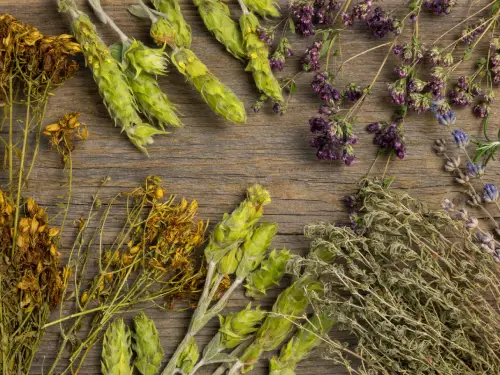Growing medicinal plants at home is just a great way to always have natural remedies at hand and transform your environment into a greener, more peaceful and therapeutic space.
In addition to their health benefits, medicinal plants are easy to care for and ideal for those who want to add a touch of nature to their home.
That’s why we’ve listed nine popular and useful medicinal plants that you can grow at home, with growing tips and information on their main uses.
Content
ToggleLlemon Balm
Lemon balm is known for its calming effect and is widely used to relieve anxiety, insomnia and stress.
Its most common use is in homemade teas. To prepare it, simply boil a few leaves in water and drink before bed, preferably before bedtime.
This plant is easy to grow and adapts well to both gardens and pots. It prefers a place with plenty of sunlight, moist and well-drained soil.
Lavender
Lavender is a medicinal plant famous for its relaxing aroma and calming properties, as well as being widely used in cosmetics and aromatherapy.
It likes full sun and sandy, well-drained soil. Lavender prefers drier climates and requires little watering.
Its flowers can be used to prepare relaxing infusions or even in the form of essential oil.
It is also common to place sprigs of lavender inside your pillow to help you sleep.
Lemongrass
Lemongrass, known for its refreshing aroma and citrus flavor, is great for relieving headaches and aiding digestion.
It is a hardy plant that grows best in full sun and moist soil. Make sure the pot has good drainage, as excess water damages the plant.
The leaves can be used to make tea or as a spice in cooking recipes. Simply boil the leaves to prepare a tea that soothes and relieves other physical symptoms, such as a temporary headache
Ginkgo Biloba
Ginkgo biloba is a medicinal plant appreciated for its positive effects on improving memory, blood circulation and cognitive function
Originally from China, this ancient tree has fan-shaped leaves, which are dried and used to prepare teas or extracts that benefit mental and circulatory health.
Ginkgo biloba adapts well to mild climates, preferring well-drained soil and indirect sunlight, which allows it to be grown in pots and larger places, such as gardens.
Although it is a safe plant, it is always important to consult a doctor before frequent use to avoid interactions with other medications.
Fennel
Fennel is well known for its mild, sweet taste and its many health benefits.
This medicinal plant is a powerful ally in relieving digestive problems, reducing cramps and treating respiratory problems.
For those who want to grow fennel at home, it adapts well in pots and gardens, as long as the soil is fertile and the environment receives sunlight.
Its seeds are often used in infusions, which not only relieve digestive discomfort but also help you relax.
In addition, the fresh scent of fennel acts as a good room freshener, making the air lighter and more pleasant.
Its versatility and benefits as one of the best medicinal plants make it an excellent choice for home cultivation, providing well-being in a natural and practical way.
Aloe vera
Aloe vera is a plant famous for its regenerative and moisturizing properties. It is often used to treat burns, moisturize the skin and hair.
It is easy to grow at home and prefers direct sunlight and sandy soil. As it retains water in its leaves, it needs little watering.
Cut open a leaf to extract the gel inside and apply directly to the skin to treat burns or moisturize.
The gel can also be mixed into juices, but it is important to know that some parts of the aloe are not edible.
Calendula
Calendula is a flower with anti-inflammatory and healing properties that is often used to treat skin irritations and injuries.
It adapts well to the sun and can be grown in pots or gardens. It needs well-drained soil and regular, but not excessive, watering.
The petals can be used to prepare ointments and compresses, which help to treat irritations and minor injuries.
It is also possible to make infusions with its flowers for therapeutic purposes.
Cloves
Cloves have antimicrobial and analgesic properties. It has a strong aroma and is used in cooking and home remedies.
This plant likes full sun and well-drained soil and can be grown in warmer, more humid environments.
Grow cloves in a place where they can receive direct light and regular water.
You can make infusions to gargle, helping to relieve sore throats. It is also used in teas to relieve stomach cramps and discomfort.
Licorice
Licorice is a plant that helps relieve symptoms of coughs, colds and flu, as well as having anti-inflammatory properties
It prefers sandy, well-drained soil with moderate watering. It adapts to places with indirect sunlight.
Licorice root can be used to make teas or for medicinal purposes, but it should be consumed in moderation, as excessive consumption can cause side effects.
Growing medicinal plants at home is a practical and economical way to access natural treatments for different health problems.
Conclusion
In addition, plants decorate the environment, bringing therapeutic benefits and making your home more welcoming.
Each of them has its own growing requirements, but with some basic care, you can create a real medicinal plant garden.
Choose your favorite medicinal plants and start planting them at home!



